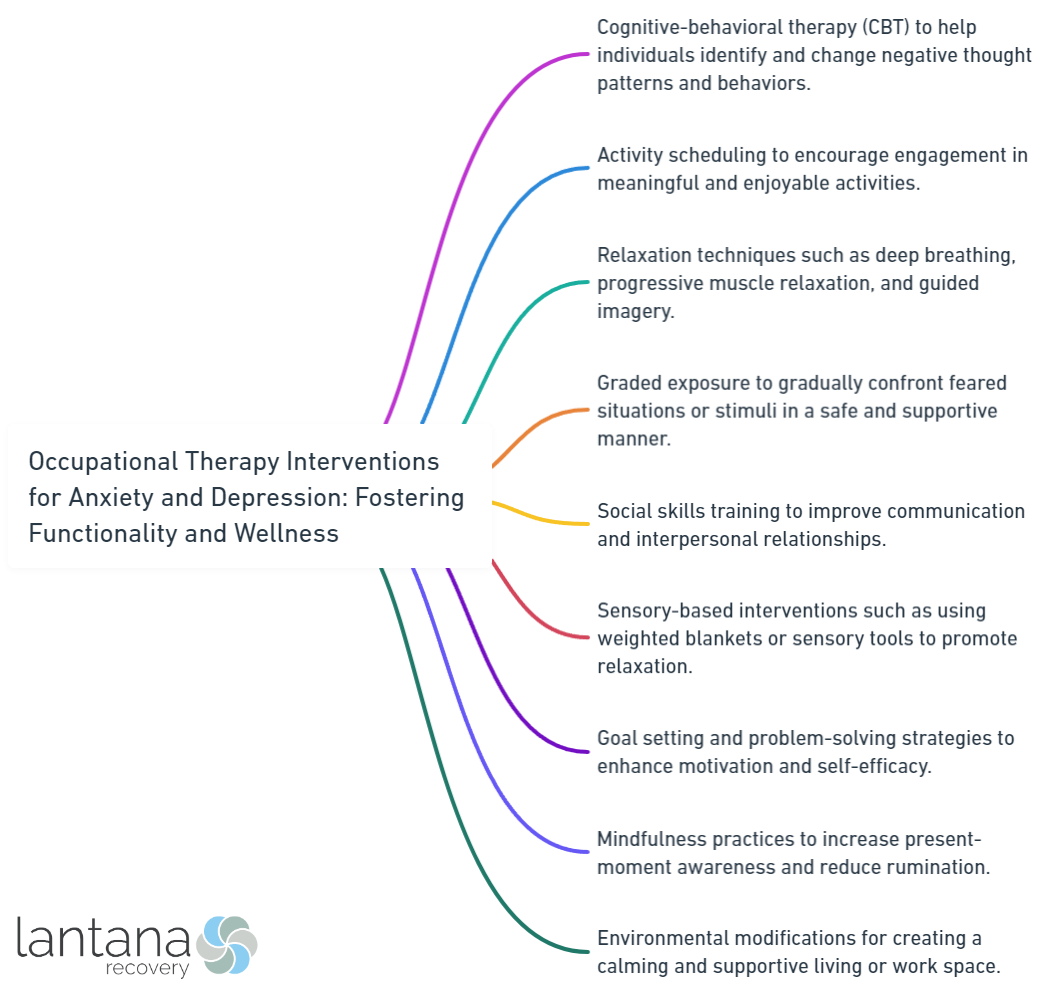Occupational therapy is a valuable intervention for individuals experiencing anxiety and depression, aiming to promote functionality and overall wellness. It is a holistic approach that focuses on assisting individuals in achieving meaningful and purposeful participation in daily activities. Occupational therapists play a pivotal role in mental health by addressing the unique challenges faced by individuals with anxiety and depression.
Occupational therapy helps with anxiety and depression by addressing various factors that contribute to these conditions. This includes exploring the individual’s thoughts, emotions, and behaviors, and identifying any underlying environmental or lifestyle factors that may be exacerbating their symptoms.
Assessment and evaluation are crucial components of occupational therapy interventions. Occupational therapists use a variety of assessment tools to gain a comprehensive understanding of the individual’s functional abilities, mental health status, and personal goals. These assessments help tailor interventions to meet the specific needs of each individual.
When it comes to anxiety, occupational therapy interventions may include cognitive-behavioral therapy, which aims to challenge and reframe negative thoughts and behaviors. Relaxation techniques, such as deep breathing exercises and progressive muscle relaxation, are also effective in reducing anxiety symptoms. Activity and task modification may be employed to help individuals gradually face their fears and build resilience.
For individuals dealing with depression, occupational therapy interventions often focus on promoting activity engagement and establishing a structured routine. Graded task assignment is used to gradually increase motivation and build a sense of accomplishment. Social skills training may also be employed to help individuals improve their interpersonal relationships and increase their social support network.
Collaboration with other healthcare professionals like those at Lantana, including psychologists and psychiatrists, is vital for a comprehensive approach to mental health care. Occupational therapists work closely with these professionals to ensure integrated and coordinated care to address the complex needs of individuals with anxiety and depression.
The outcomes and benefits of occupational therapy for anxiety and depression are numerous. It helps individuals regain a sense of purpose and meaning in their lives, improves overall functioning, reduces symptoms, and enhances overall well-being. By promoting functionality and wellness in daily life, occupational therapy empowers individuals to live fulfilling and meaningful lives despite their struggles with anxiety and depression.

What is Occupational Therapy?
Occupational therapy is a healthcare profession that helps individuals of all ages achieve and maintain optimal functionality and well-being in their daily lives. It aims to address challenges that hinder their ability to engage in meaningful activities, promoting independence and overall quality of life. Occupational therapists evaluate abilities and limitations, create personalized intervention plans, and implement evidence-based practices to meet individual needs. They use therapeutic activities, adaptive equipment, and environmental modifications to enable effective engagement in daily activities. Occupational therapy is beneficial for various conditions including neurological disorders, mental health issues, physical disabilities, and developmental delays. It empowers individuals to live fully, whether they are children with learning difficulties, adults recovering from a stroke, or older adults with arthritis.
So, what exactly is occupational therapy? It is a profession that focuses on helping people overcome obstacles and enhance their well-being in order to lead a fulfilling life.
The Role of Occupational Therapy in Mental Health
Occupational therapy plays a fundamental role in mental health by improving functionality and quality of life. It encompasses various aspects:
1. Assessment: Occupational therapists evaluate an individual’s physical, cognitive, and emotional abilities to understand their specific needs and challenges in daily life. This evaluation aids in the development of targeted intervention plans.
2. Treatment Planning: Collaborating with clients, occupational therapists set goals and create personalized treatment plans. These plans address the individual’s unique requirements and aim to enhance mental health and functionality.
3. Skill Development: Occupational therapy fosters the growth of skills that promote mental well-being, including stress management, coping skills, social interaction, time management, and problem-solving abilities.
4. Environmental Modification: Occupational therapists identify environmental factors that could contribute to mental health difficulties. They make necessary modifications to create a positive and supportive environment conducive to mental well-being.
5. Activity Engagement: Engaging in meaningful activities is crucial for mental health. Occupational therapists assist individuals in exploring and participating in activities that bring joy and fulfillment, ultimately boosting overall well-being.
6. Collaboration: Occupational therapists work closely with other healthcare professionals to provide a holistic approach to mental health care. This collaboration ensures comprehensive and integrated support for individuals.
By understanding the essential role of occupational therapy in mental health, individuals can make informed decisions about seeking this valuable intervention. Occupational therapy offers unique strategies and interventions tailored to each individual’s specific needs, helping them achieve improved mental health and overall well-being.
How Does Occupational Therapy Help with Anxiety and Depression?
As discussed by Gunnersson et al., in a 2021 study, depression is widely diagnosed in psychiatry and stands as the primary contributor to reduced health and loss of function across all diagnoses. Occupational therapy is a beneficial tool in addressing anxiety and depression. By incorporating evidence-based interventions and a client-centered approach, occupational therapists assist individuals in managing their mental health. There are various ways in which occupational therapy aids in alleviating anxiety and depression:
1. Developing coping skills: Occupational therapists naturally help individuals recognize and cultivate effective coping strategies. This can involve teaching relaxation techniques, stress management strategies, and mindfulness practices.
2. Addressing daily routines: Occupational therapists aid individuals in establishing a structured daily routine that promotes a sense of purpose and stability. They break down tasks into manageable steps, enabling individuals to engage in meaningful activities and achieve their goals.
3. Activity analysis and modification: Occupational therapists naturally assess and modify activities to suit individuals’ abilities and requirements. By doing so, they boost self-esteem and overall well-being, providing a sense of control and accomplishment.
4. Social participation: Occupational therapists collaborate with individuals to enhance social skills, encourage social connections, and improve the ability to engage in meaningful social activities. Consequently, this alleviates feelings of isolation and loneliness.
5. Environmental modifications: Occupational therapists assess both home and work environments to identify potential stressors and develop strategies for modifying them. This has a significant impact on an individual’s mental health.
Incorporating occupational therapy into the treatment plan for anxiety and depression significantly improves overall well-being and quality of life. It is crucial to consult with a qualified occupational therapist for personalized support.
True story: Sarah, a young woman struggling with depression, sought help from an occupational therapist. Through therapy sessions, Sarah acquired coping techniques and regained a sense of purpose and structure in her life. By analyzing her activities and making necessary modifications, Sarah rediscovered joy in her hobbies. With the unwavering support of her occupational therapist, Sarah regained her confidence and successfully reintegrated into her social circle. Environmental modifications, coupled with ongoing therapy, empowered Sarah to effectively manage her anxiety and depression.
Assessment and Evaluation in Occupational Therapy
Assessment and evaluation are crucial components of occupational therapy. They play a vital role in gaining valuable insights into a client’s abilities, challenges, and goals. Occupational therapists employ a variety of methods and tools to assess physical, cognitive, and emotional functioning, as well as social and environmental factors.
Throughout the assessment process, therapists closely observe and engage with the client, gathering information about their daily activities, routines, and interests. They may utilize standardized assessments such as the Canadian Occupational Performance Measure (COPM) or the Assessment of Motor and Process Skills (AMPS) to evaluate performance and identify areas of difficulty.
Evaluation entails analyzing the assessment results to comprehend the client’s strengths and limitations. This analysis aids therapists in developing personalized intervention plans tailored to the individual’s needs and goals. Furthermore, it enables therapists to gauge the effectiveness of interventions over time and make necessary adjustments for improved outcomes.
The assessment and evaluation process in occupational therapy is a collaborative endeavor between the therapist and the client. This collaborative approach ensures interventions that are centered around the client’s needs and promotes their autonomy and engagement. The utilization of detailed information and evidence-based practices empowers therapists to provide effective interventions that optimize functionality and overall well-being.
A true historical fact underlines the significance of assessment and evaluation in occupational therapy, tracing back to the early 20th century. Occupational therapists began implementing standardized tests to measure performance and identify intervention areas. This development led to the establishment of evidence-based practices and the recognition of occupational therapy as a profession dedicated to enhancing individuals’ participation in meaningful activities. Today, assessment and evaluation continue to guide the implementation of client-centered interventions and facilitate positive outcomes.

Occupational Therapy Interventions for Anxiety
When addressing anxiety, occupational therapy interventions promote functionality and wellness. Occupational therapists employ the following interventions:
1. Activity Analysis: Occupational therapists analyze daily activities to identify triggers and modify or adapt activities to reduce anxiety levels.
2. Stress Management Techniques: Occupational therapists teach stress management techniques such as deep breathing exercises, progressive muscle relaxation, and mindfulness practices to effectively manage anxiety symptoms. Some may even use aspects of acceptance and commitment therapy (ACT) as needed.
3. Occupational Engagement: Meaningful occupations help manage anxiety. Occupational therapists work with individuals to identify activities that bring joy, purpose, and alleviate anxiety. They also assist in establishing routines and structure for stability.
4. Environmental Modifications: Occupational therapists assess the physical environment and make necessary modifications to reduce anxiety triggers. This includes creating calming spaces, optimizing lighting and acoustics, and organizing belongings for order and control.
5. Social Skills Training: Occupational therapists provide social skills training to individuals with anxiety, teaching effective communication strategies, assertiveness, and conflict resolution skills.
6. Self-Care Strategies: Taking care of oneself is crucial in managing anxiety. Occupational therapists assist in developing self-care routines that include proper nutrition, exercise, sleep hygiene, and relaxation techniques.
By implementing these occupational therapy interventions for anxiety, individuals can acquire the skills needed to reduce anxiety levels, improve functionality, and enhance overall well-being.
Occupational Therapy Interventions for Depression
Occupational therapy interventions are highly effective in treating depression. Here are key interventions utilized by occupational therapists:
- Activity-based interventions: Occupational therapists engage individuals in various activities such as hobbies, crafts, exercise, and self-care tasks to promote a sense of purpose and accomplishment.
- Goal-setting: Occupational therapists assist individuals in setting realistic and achievable goals tailored to their specific needs and abilities. This provides direction and motivation, boosting mood and self-esteem.
- Social participation: Meaningful social activities help combat feelings of isolation and improve mood. Occupational therapists may facilitate group therapy sessions, encourage participation in support groups, or assist in finding community programs or volunteering opportunities.
- Skills training: Occupational therapists help individuals develop and enhance specific skills needed to manage depression and improve daily functioning. This includes teaching stress management techniques, coping strategies, time management skills, and problem-solving techniques.
- Environmental modifications: Occupational therapists assess an individual’s living and working environments and make changes to promote a positive and supportive atmosphere. This includes creating a calming workspace, organizing daily routines, and improving overall safety and accessibility.
Occupational therapy interventions for depression focus on enabling individuals to engage in meaningful activities, regain a sense of control and purpose, improve social connections, and develop coping mechanisms. These interventions have a significant impact on individuals’ daily lives and overall well-being.

Collaboration with Other Healthcare Professionals
Collaboration with other healthcare professionals is a crucial aspect of occupational therapy interventions for anxiety and depression. Discover how occupational therapists work hand-in-hand with psychologists and psychiatrists to provide a comprehensive approach to holistic wellness. From leveraging different expertise to implementing customized treatment plans, this section explores the power of interdisciplinary collaboration in fostering functionality and well-being for individuals facing mental health challenges.
How Occupational Therapists Work with Psychologists and Psychiatrists
Occupational therapists work hand in hand with psychologists and psychiatrists to ensure that individuals with mental health issues receive comprehensive care. This collaborative approach guarantees that everyone on the healthcare team is aligned and working towards the same treatment goals and strategies.
One of the valuable contributions of occupational therapists is providing insights into the functional challenges that individuals may face. This information allows psychologists and psychiatrists to tailor their therapeutic interventions accordingly, addressing the specific needs of each person.
During the assessment and evaluation process, occupational therapists play a crucial role by offering input on individuals’ functional abilities in daily living, work tasks, and leisure activities. This input is vital for developing a comprehensive understanding of their strengths and limitations, which then informs the creation of personalized treatment plans.
In therapy sessions, occupational therapists assist individuals in developing coping skills and strategies for managing anxiety or depression. They work in conjunction with psychologists and therapists like those at Lantana, who offer support and guidance for addressing the underlying emotional and cognitive factors contributing to mental health issues. This collaborative approach ensures that individuals receive comprehensive and integrated care.
A real-life example that showcases the collaboration between occupational therapists, psychologists, and psychiatrists is the case of Jane. Jane, a young woman with severe anxiety, benefited from the gradual exposure therapy and metacognitive therapy provided by the occupational therapist. Additionally, the psychologist helped her understand the underlying thoughts and emotions contributing to her anxiety, offering cognitive-behavioral therapy.
Thanks to this collaborative approach, Jane significantly improved her anxiety management, developed effective coping strategies, regained her ability to engage in daily activities, and overall experienced enhanced well-being. Jane’s case serves as a powerful demonstration of the importance of occupational therapists and psychologists working together to address the multifaceted needs of individuals with mental health conditions.
Outcomes and Benefits of Occupational Therapy for Anxiety and Depression
The outcomes and benefits of occupational therapy for anxiety and depression are numerous. For instance, the “Tree Theme Method® (TTM) is a client-centred occupational therapy intervention designed to increase the ability to cope with, and to enhance satisfaction with, everyday life, both at home and at work (Treatment of depression and/or anxiety, Gunnarsson et al., 2018.) These interventions promote functional improvement and overall well-being. There are several key benefits that individuals can experience through occupational therapy:
-
Improved coping skills: Occupational therapy assists individuals in developing effective strategies to manage and cope with symptoms of anxiety and depression. By implementing techniques like cognitive-behavioral therapy, individuals can identify negative thoughts and behaviors and replace them with more positive and adaptive ones.
-
Enhanced daily functioning: Occupational therapy improves individuals’ abilities to engage in meaningful activities and tasks in their daily lives. By addressing challenges associated with anxiety and depression, occupational therapists help individuals regain independence in areas such as self-care, work, leisure, and social activities.
-
Increased emotional regulation: Occupational therapy emphasizes emotional self-awareness and regulation. Through the use of techniques like mindfulness and relaxation exercises, individuals can better manage stress, regulate emotions, and develop a sense of calmness and balance.
-
Improved social skills and relationships: Occupational therapy supports individuals with anxiety and depression to enhance their social skills and build healthier relationships. By providing opportunities for social engagement and facilitating communication and interpersonal skills, occupational therapists aid in the development and maintenance of relationships that contribute to overall well-being.
-
Promotion of overall well-being: Occupational therapy takes a holistic approach by addressing physical, mental, and emotional health. By focusing on all aspects of well-being, occupational therapy interventions contribute to improved quality of life for individuals with anxiety and depression.

Promoting Functionality and Wellness in Daily Life
Promoting functionality and wellness in daily life is crucial for individuals with anxiety and depression. Occupational therapy can provide valuable support to help them achieve these goals.
- Establishing routines: Structured daily routines create stability and purpose, promoting functionality and wellness. They can be achieved by setting regular waking and sleeping times, planning activities, and practicing self-care.
- Enhancing self-care skills: Developing and improving personal hygiene, healthy eating habits, and exercise routines is essential for promoting functionality and wellness in daily life.
- Cultivating social connections: Building and maintaining social relationships is important for mental health and promotes functionality and wellness in daily life. Occupational therapists can help individuals find and participate in social activities aligned with their interests and values.
- Boosting productivity: Engaging in meaningful activities enhances well-being and promotes functionality and wellness in daily life. Occupational therapists assist individuals in pursuing hobbies, volunteering, or vocational pursuits to feel accomplished.
- Promoting stress management techniques: Learning effective stress management techniques helps cope with anxiety and depression, promoting functionality and wellness in daily life. Occupational therapists teach relaxation exercises, mindfulness, and strategies for managing daily stress.
By focusing on functionality and wellness, occupational therapy empowers individuals to regain control, improve mental health, and lead fulfilling lives. Reach out to an outpatient rehab center near you to connect with healthcare professionals today!
Frequently Asked Questions
What is the purpose of the study protocol in the cluster-randomized controlled trial of the occupational therapy group intervention?
The study protocol outlines the background, methods, and aims of the trial. It provides a comprehensive overview of the research design, including the rationale for the study, the interventions being tested, the measurement outcomes, and the statistical analyses that will be conducted.
How are the schools selected for participation in the trial?
The 14 schools participating in the trial will be randomly assigned to either the intervention or waitlist control arm. This random assignment ensures that the two groups are comparable at the start of the study and minimizes bias in the results.
What is the intervention being tested in the trial?
The intervention being tested is an 8-week occupational therapy group intervention called Kia Piki te Hauora. It aims to promote emotional wellbeing in children aged 11-13 years by addressing symptoms of anxiety and depression, improving self-esteem, increasing participation in daily activities, and enhancing overall wellbeing.
How will the outcomes of the trial be measured?
The primary outcome measure of the trial will be symptoms of anxiety. Secondary outcomes will include symptoms of depression, self-esteem, participation in daily activities, and overall wellbeing. These outcomes will be measured at baseline, post-intervention, and during an 8-9 week follow-up period to assess the long-term effects of the intervention.
Why is this trial significant for occupational therapists?
This trial is significant for occupational therapists because it is the first cluster-randomized controlled trial to investigate the effectiveness of an occupational therapy intervention for promoting emotional wellbeing in a non-clinical sample of children. The results of the trial will contribute to the limited evidence base for occupational therapists in this field and potentially support investment in these services.
What is the aim of this study on occupational therapy interventions?
The aim of this study is to investigate the effectiveness of an 8-week occupational therapy group intervention in reducing symptoms of anxiety and depression, improving self-esteem, increasing participation in daily activities, and enhancing overall wellbeing in children aged 11-13 years. The study will provide valuable evidence for the use of occupational therapy as a preventative intervention for promoting mental health in children.









